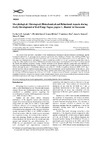Identificador persistente para citar o vincular este elemento:
https://accedacris.ulpgc.es/jspui/handle/10553/15143
| Título: | Morphological, histological, histochemical and behavioral aspects during early development of red porgy Pagrus pagrus L. reared in mesocosm. | Autores/as: | Andrade, Carlos A.P. Soares, Florbela Ribeiro, Laura Roo, Javier Socorro Cruz, Juan Antonio Dinis, Maria Teresa |
Clasificación UNESCO: | 251092 Acuicultura marina | Palabras clave: | Red porgy larvae Larval organogenesis Larvae feeding behavior Larvae cannibalism |
Fecha de publicación: | 2015 | Publicación seriada: | Turkish Journal of Fisheries and Aquatic Sciences | Resumen: | The present study provides a description of the morphological, histological and histochemical development, and the ecological implications of red porgy larvae reared in mesocosm, from hatching to 30 days after hatching (DAH). Four development stages were defined by body total length (TL), in agreement with major patterns of larval organogenesis. The first stage was characterized by the highest TL relative growth rate (RGR=7.23% day<sup>-1</sup>) as larvae elongate their body to escape the culture media viscous forces. RGR decreased in the second stage of development (4.34% day<sup>-1</sup>), as larvae opened the mouth and initiated exogenous feeding. Protein inclusions at the posterior digestive epithelium were indicative of pinocytosis and intracellular digestion. Yolk reserves were consumed at slower rate (until 5 DAH) than larvae in intensive culture, although the peak of swim bladder inflation occur earlier (8-11 DAH). A significant decrease in RGR (1.55% day<sup>-1</sup>) and the notochord flexion characterized the third stage of larval development. Larvae migrated deeper in the tank (14 DAH) and adopted an aggressive behavior (17-19 DAH). Gastric glands in the forthcoming stomach were common at 20 DAH. In the last stage of larval development the RGR was 3.62% day-1. A sharp increase of Artemia consumption from 26 DAH and cannibalism denoted a change in the digestive mode. Results suggest that red porgy larvae growth and development priorities, and behavior patterns at early stages are directed to increase the number of captured prey. | URI: | https://accedacris.ulpgc.es/handle/10553/15143 | ISSN: | 1303-2712 | DOI: | 10.4194/1303-2712-v15_1_15 | Fuente: | Turkish Journal of Fisheries and Aquatic Sciences [ISSN 1303-2712], v. 15 (1), p. 137-148, (Enero 2015) |
| Colección: | Artículos |
Citas SCOPUSTM
1
actualizado el 08-jun-2025
Citas de WEB OF SCIENCETM
Citations
2
actualizado el 15-feb-2026
Visitas
43
actualizado el 11-ene-2026
Descargas
60
actualizado el 11-ene-2026
Google ScholarTM
Verifica
Altmetric
Comparte
Exporta metadatos
Este elemento está sujeto a una licencia Licencia Creative Commons

